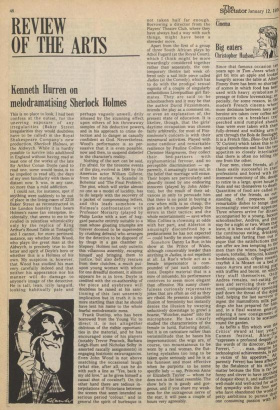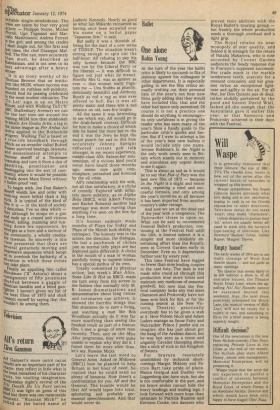Cinema
Big eaters
Christopher Hudso
Since that famous occasion tea years ago in Tom Jones when a girl bit into an apple and looked hungrily across the table at Albert Finney there has been no shortage of scenes in which food has been used with heavy symbolism t° presage or follow lovemaking; es" pecially, for some reason, in the modern French cinema where more decisions between hero and , heroine are taken over coffee and croissants on a breakfast traY perched amid rumpled sheets, than were ever taken with the fully-dressed and walking arm in arm through the Bois de Boulogne' It is a French film, Blow-Out (GL' 'X' Curzon) which takes this to it5 logical apotheosis and has the twe appetites so closely interlinit.ed that there is often no telling the one from the other. Four men, close friends, all °f them easily successful in their professions and bored with the insensate monotony of life, decide to retire to a large, quiet house i° Paris and eat themselves to death' Quantities of food are called in and one of the friends, an nut" standing chef, prepares sorne remarkable dishes to tempt their increasingly enervated appetites. Three whores arrive for dinner' accompanied by a young, buxoal schoolteacher, Andrea, and the, stay for a night or two. When th.e,„Y leave, it is less out of disgust W04' the continuous eating, drinking; belching and farting than out 01 pique that the satisfactions theY can offer are less tempting to the men than the wines, baguettes, oysters, tortelini, fettucini, kidneYs bordelaise, quails, crepes suzette; crayfish a la Mozart on a bed 01 sauce Aurora and suckling Ohs with truffles and bacon, on whic,„" they stuff themselves. On', Andrea remains, out-eating th!, men and servicing their eve" need, compassionately spooniq pate down the throat of the dYirle„ chef, helping the last survivor tiu, ingest the mammiform milk 0.1.„u dings she has prepared for 1111"; and, in a final wanton gestuoi ordering a new consignment refrigerated meats to be scatter round the garden.
As befits a film which won he
Critics' award at last yet Cannes festival, Blow-w!,, "expresses a profound despair" II..., the words of its director, MarC.: Ferreri, ". . . man, despite technological achievements, is sto a victim of his appetites." parently Ferrerj has been affect by the flatulence of his subj'„ matter because the film is far tw, funny and clever to have anYthi,h; of despair about it, and sufficier well-made and well-acted for usl, feel sympathy with the four who have abandoned the world petty ambitions to pursue thet', one consuming passion with a° opectator January 12, 1974
mirable single-mindedness. The roles are taken by four very good
actors — Philippe Noiret, Michel
Piccoli, Ugo Tognazzi and Marcell° Mastroianni; Andrea Ferreol iS the girl; and among the credits shall single out, for this first and laSt time, the chef Giuseppe Mal fioli. The film can, more accurately than most, be described as Rabelaisian, and is not seen to its best advantage after a heavy dinner.
It is an irony worthy of Sir Thomas Browne that an institu tion like MGM, whose success was founded on ruthless self-publicity, should find its passing celebrated in the most modest obituaries. The To Let' sign is up on Metro
liouse, and with Walking Tall ('X' ABC Shaftesbury Avenue) we can
for the last time see around the
roaring MGM lion that shibboleth to kitsch Ars Gratia Artis, a tag in the same league as Per Ardua Ad Astra applied to the Rothschild Progeny. Walking Tall is based on
a true-life bloodbath through Which an ex-wrestler called Buford Pusser survived beatings, lawsuits, Slid assassination attempts to
become sheriff of a Tennessee township and turn it from a den of rgarnbling, prostitution and 000tlegging into the sort of coatkunity where it would be possible to walk down Main Street without a bullet-proof vest. To begin with, Joe Don Baker's sheriff wields law and order with nothing more lethal than a big stick. It is typical of the kind of fiko it is — or the kind of society it describes, I've no idea which that although he straps on a gun and ends up a crazed and vicious anirnal, killing, maiming and run ning down his opponents, he ernerges as a hero and a saviour of
the community, a wholly credita ble lawman. So sincerely is this view presented that there are
everal genuinely moving and IniPressive sequences which tempt Us to overlook the barbarity of a situation in which these events an take place. Pinally an appalling film called Qiindman ('X' Astoria) about a consignment of fifty prostitutes Shuttled between a gaggle of LVIexican bandits and a blind gun4"rghter. I haven't given my list of 'Ile best films of 1973 and shall eontent myself by saying that this Wouldn't be among them.



































 Previous page
Previous page